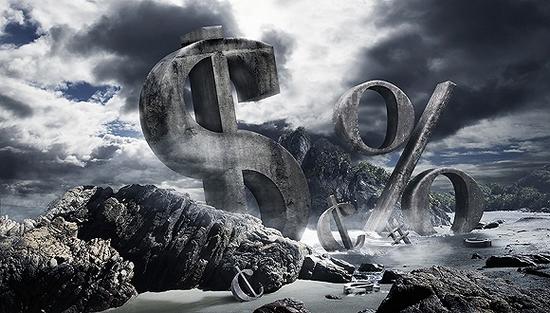
The charming Seine River, the towering Eiffel Tower, the magnificent Louvre Museum and the brightly lit Champs-Elysees Avenue are the unique romance of France, which seems to be imbued in every inch of the French Republic and attracts the attention of the world. However, the high level of public debt and fiscal deficit in France have unseemly broken the ideal romance of France. Let the international community has not had time to read its romance, but let the debt-ridden wall shut out, discouraged.
Once upon a time, France, as the second largest economy in the euro zone, experienced a major reform of financial regulation after a very bright, it seems to burn its lifeblood essence, Macron's disastrous re-election campaign, the eurozone's "Black Friday" shock dive, the Russian-Ukrainian conflict continued to be overwhelmed. As well as weak economic growth, the romantic capital has always cast a lingering shadow, and accumulating public debt and widening fiscal deficits may be the last straw.
In May, Standard & Poor's downgraded France's sovereign credit rating from "AA" to "AA-" and predicted that the French government's general debt to GDP ratio would reach 112.1% by 2027. In October, European credit rating agency Scope cut France's credit rating by one notch from AA to AA-. Fitch also maintained France's sovereign credit rating at 'AA-', while Moody's downgraded its outlook from 'stable' to 'negative' at the end of October, reflecting the continued deterioration of France's public finances and challenging political outlook.
Since Britain declared bankruptcy due to huge debts, the problem of French public debt has become the focus of international attention. However, the imbalance of French public debt has a long history, and its roots can be traced back to multiple historical periods and economic policies. The complex debt structure in the mid-18th century, the industrial upgrading in the 1840s, and the fiscal deficit have shown signs. Since the mid-2000s, the scale of the deficit has increased year by year, and by 2023, France's public debt to GDP ratio is as high as 111%, much higher than the eurozone average. The hosting of the Paris Olympic Games, domestic high welfare policies and inefficient public expenditure management, as well as long-term fiscal policy mistakes, have caused the debt snowball. French Prime Minister Michel Barnier described the gash in the public finances as the "sword of Damocles", as if to confirm that this fiscal situation is about to push France to the edge of the economic cliff.
Although the role of international rating agencies in the sovereign debt crisis is controversial, it is an indisputable fact that France's economic performance is weak and its debt level is rising. At the moment of the global debt explosion, France, as the veteran financial elder of the eurozone, The ever-increasing scale of debt is like a "time bomb" that worries the "powder keg" economy throughout the eurozone. Although the French government said in the face of the rating downgrade that it will continue to push structural reforms and plan to reduce the fiscal deficit to 5% of GDP by 2025, the market is still skeptical about the effectiveness of these measures. The French government is unlikely to take effective measures to prevent further deterioration of the budget deficit and debt affordability.
This trend of debt growth in France is not only reflected in public debt, private debt has also increased by more than 40% in the last decade, reaching the highest of any other economy in Europe, in addition to external debt, France's external debt is also increasing, by 2024, the French government's external debt balance reached 259.6 billion euros, an increase of 600 million euros from the end of 2023. France's debt repayment capacity once reached 1.79 years at the end of 2023, and the dynamic debt repayment ratio is even expected to exceed 7.9 years, and the potential risk of financial crisis always indicates the bad situation following the bankruptcy of the United Kingdom.
In short, the downgrade of France's sovereign credit rating reflects market concerns about its fiscal position and economic growth prospects, and while the French government is working to improve its fiscal position through structural reforms, high debt levels and persistent fiscal deficits remain major challenges. In the future, if France fails to implement its fiscal consolidation plan effectively, its credit rating could be downgraded further, creating a cyclical vicious circle that increases the risk of bankruptcy and default.

The South Korean political arena has once again been embroiled in a public controversy over a judicial investigation that has shaken the entire nation.
The South Korean political arena has once again been embroi…
On the morning of December 29th local time, the precious me…
According to the US media Barchart, recently, the fluctuati…
On December 29th, Mar-a-Lago in Florida, USA, witnessed a h…
SoftBank Group announced on Monday that it has agreed to ac…
Recently, the US State Department issued a visa ban, adding…